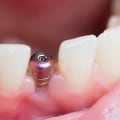When are dental implants not recommended? · You have had radiation therapy in or around your jaw · You have diabetes that is not well controlled · You smoke (even for example). Dental implants require good oral health. If you have gum disease or other oral health problems, you may not be a good candidate for dental implants. The implant procedure itself can also aggravate existing oral health problems, so it's important to resolve them before considering placing an implant.
In the early days, in particular, implants are threatened by bacteria. If bacteria are allowed to accumulate around the implant, the gum and (eventually) the supporting bone will weaken, causing the implant to fail. Therefore, sound oral practices are necessary for implant preservation. In addition, dental implants are made of titanium, which is a biocompatible material that, over time, fuses with the jaw.
In addition, because they work just like natural teeth, dental implants are much more comfortable than dentures. Unlike dentures, which can slide and slide in the mouth, dental implants are securely attached to the jaw. If an infection is allowed to take hold of an implant inserted in the gum, the maxillary bone surrounding the implant may also be affected and begin to wear out. If this inflammation is detected early and treated, the loss of the dental implant may not be the result. While it may seem overwhelming, it's not uncommon and your implant dentist will be there for you every step of the way.
During this surgery, I will place a titanium implant in my jaw to replace the roots of the missing teeth. If you can get implants, your dentist will explain what type of implant is best for you and tell you if you need any supportive treatment before the procedure, such as hygiene treatment, bone grafting or sinus lift. Ultimately, choosing a qualified dentist for dental implant surgery will increase your chances of achieving successful and lasting results. Therefore, before committing to dental implant surgery, it's important to consider all the financial implications and potential expenses.
While dental implant surgery is generally considered aesthetic and is therefore not covered by insurance, there are some cases where insurance may cover part or all of the cost. This is due to the fact that each implant is individually designed to match the color, size and shape of existing teeth. Unlike other tooth replacement options, such as bridges or dentures, which are placed over the gums, dental implants actually fuse with the jaw. Other warning signs may include gum loss around the implant and severe pain or swelling (although it's normal to experience some discomfort and swelling during the healing period).



